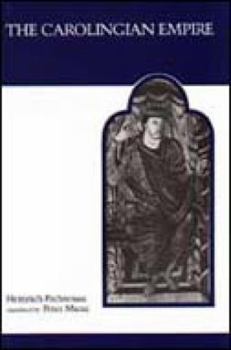The Carolingian Empire (Revised)
Select Format
Select Condition 
Book Overview
Originally published by Basil Blackwell Publishers, 1957 This description may be from another edition of this product.
Format:Paperback
Language:English
ISBN:0802063675
ISBN13:9780802063670
Release Date:December 1978
Publisher:University of Toronto Press
Length:196 Pages
Weight:1.75 lbs.
Dimensions:0.5" x 6.0" x 9.0"
Customer Reviews
2 ratings
Charles the Great and his Empire
Published by Thriftbooks.com User , 18 years ago
This is another of the many great books about the Middle Ages I was referred to by Norman F. Cantor in "the inventing of the middle ages". I doubt I would ever have come across this book without the help of Cantor's guide to the literature. This book is translated from the German... in the sixties, but Fictenau is writing about the 800's, so you shouldn't be put off by the age of the book. The copy that I bought is a reprint by the "mediaveal academy for teaching". It has a plain red orange cover and lacks charm. The basic idea of the book is that the Carolingian Empire managed to combine a number of conflicting trends through the strong personality of its leader... Charles the Great. After the death of Charles, the conflicts were brought to the front, and the empire disintegrated. So lay off on on Louis the Pious, OK? It wasn't his fault that the Carolingian Empire fell apart! This is a very manageable book (170 pgs.) on an immense topic and I recommend it as an introduction to the subject.
Provocative Analysis of the Reign of Charles the Great
Published by Thriftbooks.com User , 19 years ago
The reign of Charles the Great is conventionally described as a brief flash of light in a dark age, one whose embers made succeeding periods less gloomy and laid the foundation for the eventual rise of Europe. In his text titled The Carolingian Empire Heinrich Fichtenau argues that historians have been bedazzled by the legendary Charles the Great and that a richer, truer understanding will emerge if more attention is focused on the disappointing aspects of the Carolingian period. Fichtenau further states that it is a mistake to attribute the rapid unraveling of the Frankish empire primarily to the incompetence of Charles' successor, Louis the Pious. During his reign, Charles the Great repeatedly addressed the disruptive internal forces within his hastily created empire through temporary measures of political expediency. Likewise, although Charles the Great was able to compel his subject to observe the formalities of Christianity, the ruling class, and even the clergy itself, was only marginally influenced by the spiritual and ethical aspects of Christianity. Throughout his reign the ruling class was characterized by excessive self-interest, greed, and ruthlessness.Fichtenau refines Einhard's famous depiction of Charlemagne by incorporating the writings of the palace scholar Alcuin as well as a more controversial source, the monk of St. Gall. The translator, Peter Munz, explains that while some might consider Professor Fichtenau's approach to be less precise and less cautious than typical academic studies of the Carolingian period, it is precisely for Fichtenau's thoughtful and provocative analysis that this work was selected as a Medieval Academy Reprint for Teaching.Professor Fichtenau has created a fascinating overview of the social, economic, political, and religious problems that faced Charles the Great. The Carolingian Empire should appeal to all readers with an interest in the Medieval period.





